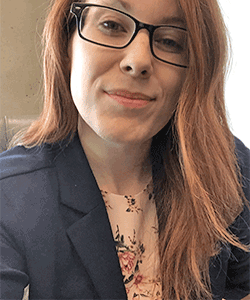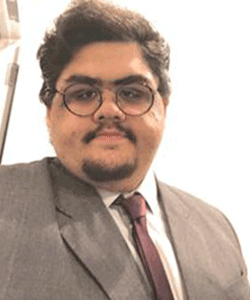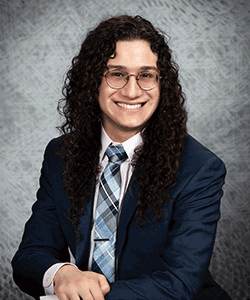Double Major in Math
Drexel’s math majors (BA and BS) are built with a flexible curriculum, making it very feasible to add another major without extending the time of study. Hear from math majors and alumni about why they decided to pursue a double major — along with their tips for success!

Muneera Cadersa
BA Mathematics and BS Data Science ’24
Why did you choose to double major in math?
Coming into Drexel, I knew that I did not want to graduate with only one bachelor's degree. Along with the huge investment and time commitment, I felt that I could do so much more. I started exploring several other fields which could complement my Data Science major, and math seemed to be the perfect complement with any technical major. I feel that Mathematics is very broad but is also ubiquitous in any field in the industry. I strongly believe that mathematics also helps a person become more pragmatic, literate, conversant, and knowledgeable in a plethora of fields.
Read more about Muneera
What are your goals or aspirations with your Drexel degrees?
Upon graduation with both degrees, I plan to join a big tech firm where I can further explore data science and mathematics in my respective fields. I also wish to pursue a master's degree or a phD in a technical field soon after I graduate. Eventually, I want to start my own data science consulting firm after gaining a few years of work experience.
Do you have any advice for other Drexel students who want to double major?
It is not a conventional path, but I highly advise students to go for it if they have multiple interests. Two majors mean twice the amount of hard work. Yet, nothing is impossible if you have the passion and you're willing to put in the effort. Have faith in yourself, plan well and take every opportunity which comes your way. Lastly, try to use each day as a new opportunity to go over and above your own set limits.

Omesh Dhar Dwivedi
BS Mathematics and BS Physics ’22
Do you have any advice for other Drexel students who want to double major?
My advice to students considering a double major in mathematics, or even switching to a mathematics major, would be to connect to the large community of students studying mathematics. They, especially upperclassmen, would be helpful and better able to paint their experience to you than anyone else. Connecting with departmental organizations like the Math Student Organization (MSO) is also a great way to connect to other people doing mathematics.
The best part of the mathematical curriculum at Drexel is its flexibility. You can take pure math courses, applied math courses, or even computational mathematics courses, and there are only a few required courses. While mathematics is a more rigorous subject than most, it can also be much more enjoyable. And if you like problem solving, maybe mathematics is a major for you. If you have more questions about switching to mathematics major or a double major, feel free to email me, and I would be more than happy to help.
Read more about Omesh
Why did you choose to double major in math?
I was always interested in physics, and also studied a lot of math to get better at physics. I did my high school in India where the college entrance exams are very rigorous and require an in-depth understanding of advanced calculus-based physics, mathematics and chemistry. While preparing for those, I realized that I naturally had an intuition for pure mathematical concepts such as combinatorics and number theory, as well as linear algebra. I also realized that I was fascinated by proofs.
When I started at Drexel, I planned to take advanced mathematical courses to further my understanding of physics. I took linear algebra and mathematical reasoning in freshman year, and that revived my interest in proof-based mathematics to start viewing mathematics as more than a toolbox for physics. During the end of my sophomore year, I decided to add a math major solely to dive more into my intellectual interest. I was also the vice president of the MSO at that point, and I started interacting with more people in mathematical community and that was essentially very helpful as I found out about fun contests such as Putnam and started considering research in mathematics.
What are your goals or aspirations with your Drexel degrees?
I came into Drexel already decided that I was going to pursue a PhD in physics once I graduate. However, adding math and taking several rigorous, proof-based courses had an impact on my mindset. My pre-junior year, I took a couple of graduate pure math courses in algebra and graph theory, and they helped me finally decide that I want to pursue graduate school in algebraic geometry and not in physics, which would have surprised my freshman self!

Aseni Ariyaratne
BA Mathematics and BS Economics ’22
Why did you choose to double major in math?
I decided to double major in math firstly because I have always really enjoyed math and wanted to continue to expand my knowledge on the subject. Secondly, I felt that the math classes required for the major went hand in hand with some of my economics classes and would be useful to me when navigating the more statistical and mathematical parts of economics such as econometrics.
Read more about Aseni
What are your goals or aspirations with your Drexel degrees?
Although I am not one hundred percent certain about what I would do after graduation, at the moment I would like to pursue a career in economics, focusing on policy studies and humanitarian work.
Do you have any advice for other Drexel students who want to double major?
I have never felt like doubling majoring is a lot of work or that it cannot be done, because I am pursuing two fields that I am deeply passionate about. My advice to other students who would like to double major is that as long as you are majoring in fields you truly love and enjoy, it is a very rewarding and worthwhile experience!

Nicholas DeFilippis
BS Mathematics and BS Computer Science ’22
Why did you choose to double major in math?
I originally came to Drexel as a computer science major, but as I was approaching the end of my math requirements for that degree, I found myself really enjoying the material. I was looking through the math minor requirements when I realized that going for a double major would also be possible, especially with the overlap from some of my computer science courses. I have been able to apply many of the techniques and concepts I learned through my math classes to my other classes and co-ops.
Read more about Nick
What are your goals or aspirations with your Drexel degrees?
After Drexel, I plan to apply to grad school for a PhD in math. I am very interested in the areas of numerical analysis, which is right at the intersection of computer science and mathematics. Many problems in the real world are too hard to be solved analytically, but by using techniques from numerical analysis, we are able to get very close approximations very quickly. I hope to do more work in this area of research after I graduate.
Do you have any advice for other Drexel students who want to double major?
The earlier you know you want to double major, the better. Talk to your adviser as soon as you can, as they most likely have advice for planning out a double major. One of the most important aspects of double majoring is having an accurate plan of study. Make sure to take into account what terms classes are offered and whether you will meet prerequisites by that time. Also, look over the requirements for both majors to find classes that can overlap for both. Finally, make sure you have good time management skills, because you will most likely have to take more classes per term than average.

Marius Garbea
BS Mathematics and BS Computer Science ’22
Do you have any advice for other Drexel students who want to double major?
There are many great reasons to pick up a double major! I say go for it if you’re passionate about multiple subjects and believe that it could help you in the future. While you have to keep in mind that a double major implies substantially more work and commitment, it is overall manageable, so don't let this reason alone stop you. Also, if your majors are closely related, many credits will overlap, so most of your time will be spent on the classes you actually enjoy taking.
Read more about Marius
Why did you choose to double major in math?
I've always been interested in math and consider it my overall favorite subject. I also strongly believe that math is the foundation of all science subjects, and as I was exploring my options in computer science, I realized that having a strong math background was a huge advantage. In short, I picked up the math major for the fun as well as the practicality of it in combination with my computer science major.
What are your goals or aspirations with your Drexel degrees?
I am planning to pursue a PhD in theoretical computer science. My math major has already helped me a ton with not only the theory classes that I took in the computer science department, but also the research projects I have been working on.

Payton Langello
BA Mathematics and BS Mechanical Engineering ’21
Why did you choose to double major in math?
I chose a double major in math, particularly the BA, because I love mathematics and couldn’t get enough of it. In addition, a double major will separate me from my peers when looking for jobs. Even though I came in with a large amount of credits, the degree program is an extremely flexible way to add value.
To give more context, I have always enjoyed math, and came to Drexel with 16 credits in math. My freshman mechanical engineering adviser and I believed that a math minor would be beneficial and not a lot of extra work. When drafting up the minor paperwork, the math program coordinator, Paige Chmielewski, suggested that I consider a BA in Mathematics. My initial reaction was that a second major would add an absurd amount of extra work.
Paige then told me that the BA in Mathematics is flexible by design. She showed me a sheet with the degree’s requirements and filled it in by hand to show that I would require only 37.5 additional credits! Wow! Doing the BA became a no-brainer in my mind. That day, in the spring of my Freshman year, I became a dual major in mechanical engineering and mathematics.
Read more about Payton
My goals/aspirations for my Drexel degrees:
- To separate myself from the competition in the job market
- Continue studying math, which I love
My advice for other Drexel students who want to double major:
I would absolutely recommend double majoring with a BA in Mathematics if you fall under these conditions:
- Your other major has a lot overlap in math
particularly, Engineering, Physics, Chemistry, or something similar
- If you enjoy math, this will be fun
- If you were already considering a math minor, this is not that much extra work and pays off a lot more
- If you came in with many credits, this makes it very easy although this is not a dealbreaker
Some of the tangible upsides of adding a double major in math:
- This second major will give you a huge leg up over your competition in the job market! I cannot stress this enough: Employers will see this and it will pay off!When comparing the difference in credits from a math minor, this will pay off much more than proportional to the added amount of work.
- When coming from a field like engineering, physics, or similar, this extra math will help you understand your native field better than your classmates.

Jeff Winchell
BA Mathematics and BS Computer Science ’21
What are your goals or aspirations with your Drexel degrees?
My current goals are to pursue a master’s, and maybe a PhD, in applied mathematics. Eventually, I would like to do research in the private sector related to medicine (e.g. predicting neurodegenerative diseases, medical imaging) in a way that leverages some math I have learned. I feel strongly about contributing to the early identification and prevention of disease, so I hope to contribute to that in some way during my career. Companies I might apply to after completing my graduate study include Deep Genomics, Arterys, and Google DeepMind.
Read more about Jeff
Why did you choose to double major in math?
I have had an interest in math since at least high school but never really viewed as a viable major because I wasn’t that experienced in it. As I progressed through my computer science degree, I realized my passion for theoretical computer science and, also, the math that underlies it. I was exposed to some linear algebra during some computer vision-related research on a summer research project I worked on freshman year. In order to understand fully fields like computer vision, formally studying math seemed to me a logical next step.
Do you have any advice for other Drexel students who want to double major?
The reason I decided to double major roots itself in my genuine interest in both math and computer science. While double majoring because you think it will look better on your resume is not necessarily a bad reason, passion makes studying more fun and carried me through the toughest classes I took. Perseverance is also important when double majoring; inevitably, there will be a class or two that you are not strong in, but don’t let that discourage you. Furthermore, while a college degree may seem to be a prerequisite for a successful career (especially in STEM), double majoring is something I can only recommend if you are passionate about both of the subjects you intend to study. Finally, learning to give and take help in different subjects based on my ability was essential to succeeding in classes. I felt at many points frustrated by my inability to grasp a particular concept and talking it out with either my professor or peers invariably left me feeling better off.

Rebecca Keeny
BS Mathematics and BSBA Finance ’20
Do you have any advice for other Drexel students who want to double major?
My two biggest pieces of advice would be don't take on more than you can handle, and make sure that if you double major, you are doing it because you believe it will make you more competitive or well-rounded as a job applicant. I worked full-time while going to school full-time and double-majoring, and I was often running on two to four hours of sleep each night. Some people can handle it, but it is not for everyone. Don't burn yourself out to the point it affects your health. Also, try to complement your first major with a second major that makes sense for your career aspirations.
Read more about Rebecca
Why did you choose to double major in math?
I originally majored in biology in my first and second semester of community college at Camden County College in New Jersey. Then I took Calculus I with professor Joseph Diaco and he taught math in a way that made it interesting and applicable to real world problems and situations, rather than having us mindlessly plug numbers into equations. He explained how math governs everything alongside the hard sciences. That's when I fell in love with the subject. I changed my major the next day.
What are your goals or aspirations with your Drexel degrees?
I originally thought I'd want to be an actuary – a natural path for math majors — but realized I don't enjoy being in front of a computer all day. I like working with people, so I might look into financial advising or sales.

Kamyar Kamyar
BS Mathematics and BS Economics ’20
What are your goals or aspirations with your Drexel degrees?
I was privileged to be able to use numerous resources at Drexel. In the three years I took to pursue my degrees, I registered for graduate-level courses, tutored mathematics and directed the economics tutoring center, and closely pursued research with faculty members. This laid an excellent learning foundation for my graduate studies. My next step to become a researcher of economics will be to get a PhD in the subject, which I will pursue at The Ohio State University, starting fall 2020.
Read more about Kamyar
Why did you choose to double major in math?
I came to Drexel as solely an economics major. However, just a few weeks in classes, I was advised by two economics professors to also pursue a degree in mathematics. This was majorly due to the mathematical nature of economic sciences — as I was aiming (and still aim!) to get a PhD in economics after my undergraduate degrees at Drexel. With a strong understanding of mathematics, I see myself able to pursue research in economics.
Do you have any advice for other Drexel students who want to double major?
One major advice is to take a lot of time to plan the courses you’ll be taking. Two majors mean twice the complications and required courses that are not offered all terms. Good communication with both advisors is also of huge importance.

Erixen Cruz
BS Mathematics and BS Physics ’20
What are your goals or aspirations with your Drexel degrees?
I want to use my skills to help people make informed decisions backed up by sound reasoning and an understanding of data gained through math. Next week, I begin working at Cesium in Philadelphia as a 3D software developer, doing just that.
Why did you choose to double major in math?
I chose to double major in math because I was unsatisfied with the mathematical rigor of physics classes. We use math formulas and concepts often without understanding the theory behind them completely as a mathematician would. Being a strong mathematician thus makes you a better physicist, and it also makes you even more flexible in the job market.
Read more about Erixen
Do you have any advice for other Drexel students who want to double major?
My advice is to take as many classes as you can, as early as you can. You don't have to declare the major to take classes as if you were one. By taking the classes, you will learn if you are actually up to double majoring, and the earlier you complete them, the more free time you will have in your final year or so, which is the crucial time when job searching and other commitments converge on you.

Othon Theodoros Tzamtzis
BA Mathematics and BS Physics ’20
Why did you choose to double major in math?
I started off my Drexel career as a physics major. At some point, I realized that many physics topics required a preexisting knowledge of some mathematical principles that were not available in the required math course list for the physics major. For that reason, I decided that I had to enrich my mathematical toolkit by taking a few extra courses.
The math minor included only a few math courses, and the math BS option seemed quite daunting to me. The math BA option seemed like a perfect fit not only because it allowed me to pick a balanced amount of math causes that I deemed necessary, but also because it incentivized me to indulge into new areas of knowledge, such as the humanities or social sciences, as part of the curriculum. Thus, double majoring in math sounded like the perfect option for me.
Read more about Othon
What are your goals or aspirations with your Drexel degrees?
Deciding on what major I should pursue has been a very difficult choice for me. Though I started with physics, I was also interested in subjects such as philosophy, psychology and English. This indecision made me question what I wanted to elicit out of my college degree. Should I choose a major that will offer me the best job prospects? Should I choose a subject that I simply find fascinating? Should I go for some combination of the two?
Ultimately, the question on which I based my decision was the following: “What sort of area of knowledge would I like to be certified in?” I realized that even though I had a burning interest in the humanities/social sciences, I would feel perfectly fine learning those things on my own or taking a few courses here and there.
I was still trying to figure out why I would want to be certified in an area of knowledge such as physics/math. That, I only realized in my third year. Each chapter within physical or mathematical topics provides one with a set of toolkits (namely proofs, equations etc.). With every new chapter, I get to learn a new set of these tools (e.g. Schroendiger equations in Quantum Mechanics) and how to use them smartly and efficiently. Even though the applications of these toolkits might be very specialized when it comes to the job market (mostly focused on research within the relative field), the mental training I had to have developed in order to understand the inner workings of each of these toolkits has allowed me to become a “trainee of toolkit mastery.”